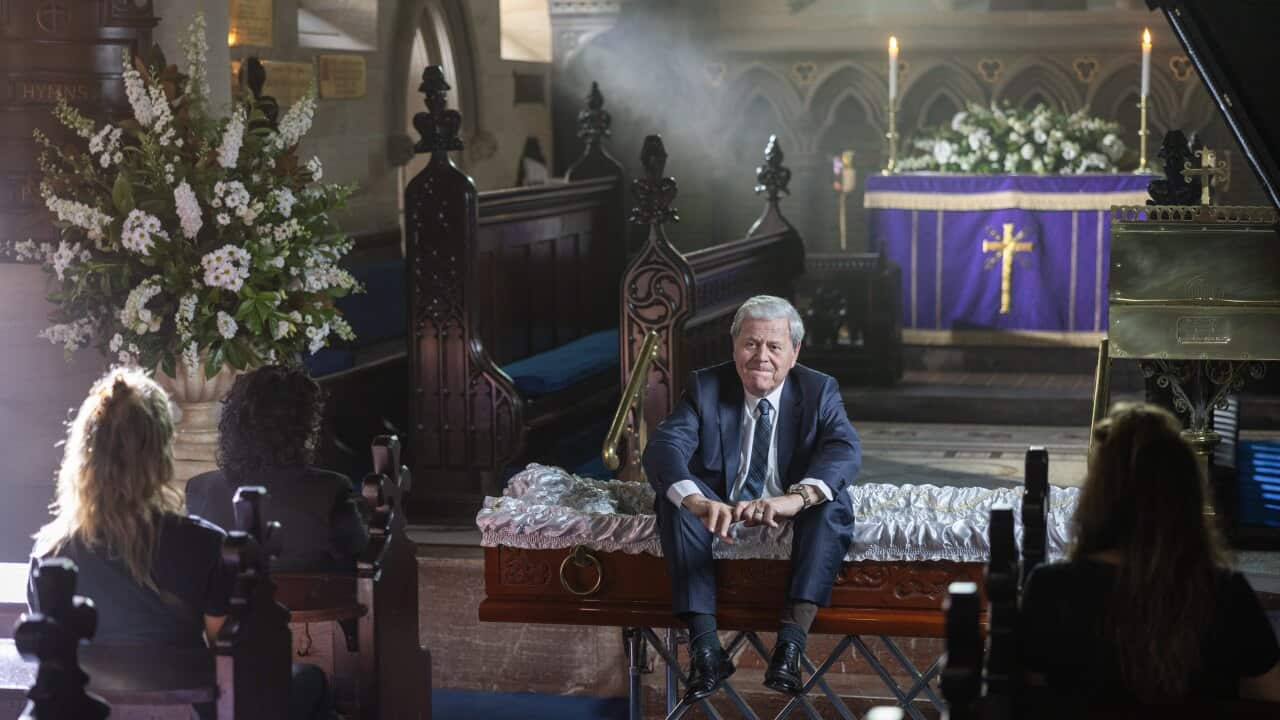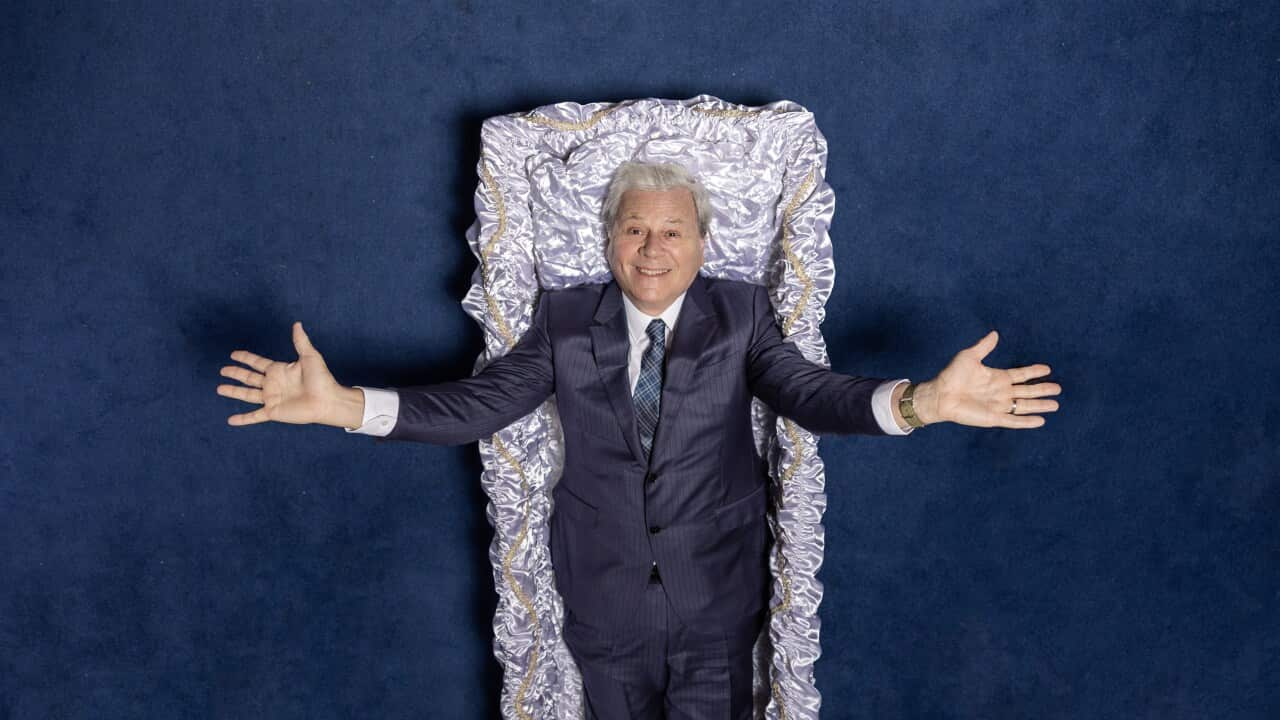Five-time Gold Logie award winner Ray Martin has a new, albeit personal, assignment: figure out his post-death plans. No, he is not sick or dying, but this year he turns 80 years old and the uncomfortable truth is that he is, statistically, nearing the end of his life, given since the average life expectancy for men in Australia is . But like many other Australians, he has not discussed his funeral plans with his friends and family.
And so he goes on a journey of discovery in a three-part SBS series, Ray Martin: The Last Goodbye. In this process, he talks to historians and religious leaders to understand how different cultures approach the rituals surrounding death, as well as everyday people who are planning for their own funeral or planning to give their deceased loved ones a fitting farewell. Along the way we also meet people who are trying to find loopholes to defy death. Does it all make for potentially uncomfortable viewing? Sometimes. But it is also deeply engaging, poignant and introspective, and along the highlights the cost, business and bureaucracy of death.
At the start of documentary, Martin believes his post-death options are binary: be buried or cremated, although along the way he discovers there’s also the slightly niche option of being turned into compost. As viewers, we get to observe his decision-making process as well as learn some deeply personal details about him. “I avoid funerals anyway, it’s just slightly worse than weddings. A bit tedious,” he says dryly, talking to SBS ahead of the show’s debut. “My mother died 25 years ago, and my sisters were keen to have her ashes scattered in the cemetery, but as you will see in the documentary, I haven’t visited the cemetery since then because my mother lives in my heart.”
He is also wary of the romanticism sometimes attached to cemeteries. Sydney’s sprawling Cemetery might be beautiful and Melbourne’s is literally in a botanical garden but Martin points out that cemeteries take up a lot of land, they are resource-heavy to maintain and are not always ecologically friendly. “Lawns need to be mowed and the next generation might not care about it."
Why exactly are traditional cemetery burials not ecologically friendly? Surely as ashes turn to ashes and dusts turns to dusts, our body disintegrates and enriches the soil. In theory yes, but Australia state-by-state laws mandates that bodies must be buried in a coffin and there are many components of a coffin that does not decompose as it is made with plastic or contains harmful materials. Nevertheless, people can decline one for religious, spiritual, or cultural reason provided they get the appropriate permissions.
“You shouldn’t have to break the bank to have a respectful funeral."
“We know more about how to buy a car or a house than how to bury someone. Obviously, we don’t want people digging holes in their backyard but some of the red tape is absurd,” Martin stresses. “You shouldn’t have to break the bank to have a respectful funeral. When we’re grieving and at our most vulnerable, we say yes to whatever is put forward without thinking why do I need a polished wooden coffin when really a cardboard one will do.”
Some have pushed back against this and tried to ‘disrupt’ the funeral industry by doing things differently or pushing the boundaries of what is allowed. Martin sits and talks with them with empathy, using the skills of a seasoned interviewer who is stoic even when spit-balling his own funeral plans. In one segment, we follow a set of siblings who put their parents’ ashes in fireworks and set it alight in the night sky over Botany Bay. Want a funeral with a happy vibe and dancing? There’s a business that will do it. Live in a regional town and want a fuss-free funeral? There’s a farmer who will help you or your next-of-kin. Want to be cremated and turned into jewellery? It is all possible, provided the right authorities sign off on it.

Ray Martin with Katrina Spade, the founder of a funeral company that offers body composting. Credit: SBS
Making your own funeral plan sounds practical and no-nonsense but as we see in the documentary, saying farewell is also bitter-sweet, moving and encased in grief. Some religions and cultures have rituals surrounding death to ease the process, but people cannot barricade themselves from the pain of losing a loved one. So, we get to see a range of touching tributes, beautiful celebrations and learn about living wakes. Even Martin’s steely resolve cracks in parts as he is confronted with his mortality and realises how his final wishes will affect his family.
“I am bit in denial about going anywhere really,” he says. But after his discoveries and discussions while making The Last Goodbye, he hopes others, like him, might be encouraged to talk about it more.
“If three hours of taking about death was grubby or a turn off, that’s not worth doing. On the contrary I found that people are really interested in talking about it. That’s good.”
Ray Martin: The Last Goodbye premiered on Wednesday 14 August at 8.30pm on SBS and . The three-part series continues weekly on Wednesdays at 8.30pm.
Stream free On Demand

Ray Martin: The Last Goodbye
series • documentary
M
series • documentary
M
EXPLORE MORE IN THESE SBS PODCASTS

Living Loss



